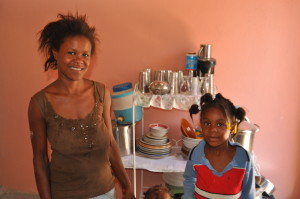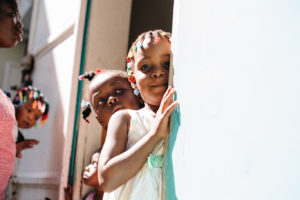I sat across from Nadege. Four other women were on the couch with me, but Nadege was doing most of the talking. I had decided to have the ladies over for dinner. There were so many things on my mind and I wanted to pick their brains. You can live in Haiti for a decade and not really understand what people are going through unless you take the time to sit and listen and ask those hard questions. I am so fortunate to have a handful of women in our artisan community who have known me long enough to open up about the difficult things that they experience.
“At what point does a person get used to being hungry?” I asked pointedly. I have no idea what it is like and need them to explain true hunger to me like a seeing person explains sight to a blind man.
“I mean, is there a point where you get so used to it that you stop feeling it?”
Nadege talked about her own experiences with hunger and her children’s experiences before she got a job.
“I can ignore it.” She said. “Sometimes it becomes such a part of your life that you don’t even notice it. You just live your life and don’t pay attention to something that you can’t change.”
“But what about your children?” I asked her, not really wanting to know the answer. It pains me to think of hungry children crying for their mother to feed them to no avail.
“Can they turn it off too?” I winced as I asked the question.
Nadege looked at me sadly and explained.
“When they are babies they can’t.” she said. They cry and cry.
“We put salt under their tongues to make them thirsty so that they will drink a lot of water and go to sleep. Sometime we have marchanns in the area who will sell us crackers on credit. Most of the time they won’t. They know we can’t pay. Sometimes a friend has a little extra, but not every day.”
She paused for a minute and her forehead wrinkled up as if she was remembering a bad moment.
“We just try to rock them to sleep. They eventually cry themselves to sleep”
She went on to tell me that at about age four they realize that hunger is a way of life and they settle in to it.
They learn that their cries won’t get them what they need and they, like their parents, learn to ignore it.
I asked if people are more hungry in the city or in the country-side.
Sonia, one of our older artisans who was sitting next to me listening and agreeing with everything Nadege said, chimed in.
“It used to be that people in the country side had more food from their gardens. But not anymore. The hurricane that hit Gonaive in 2004 took out so many of the crops that the people relied on for food. The crops still haven’t grown back to how it used to be. And then, last year, with the way Hurricane Matthew hit Jeremie, there are several kinds of vegetables and fruit that we still haven’t seen since.”
Nadege chimed back in. “Everything is SO expensive now too. Even bananas are expensive. We can barely even afford to eat the food that is grown in our own country.”
Things started clicking in my mind.
Poverty can be blamed on corruption and that can be fixed.
Poverty can be blamed on lack of trade, and that can be remedied. It’s where I spend most of my time in Haiti- trying to think of sustainable business solutions to bring jobs to Haitian mothers.
But Poverty due to an endless line up of hurricanes and natural disasters leaves little in the way of solutions. The Haitian people are just THAT resilient. They have to be. There is no remedy for where their country is situated geographically in the world. They can’t leave or change the forces of nature.
They just pick up again, rebuild as much as they can again, try not to rely on aid again and carry on.
They imagine and hope that some day they can catch a break long enough for their crops to be plentiful again, for there to be enough food to feed their children again, for prosperity to (for once) gain a foothold in this tiny battered country.
But today is not looking so good. The most powerful category five hurricane in years is barreling down on the Caribbean again and Haiti is looking for a break. The forecast shows it veering to the north a bit and the hope is that the farmers in the northern parts will be spared. The greater hope is that it misses Haiti all together.
The devastation that comes to poor communities from a hurricane like Matthew and Irma have ramifications beyond our imaginations. Today I pray that Haiti, the rest of the Caribbean, and also Miami will be spared.
If you want to help with the efforts of bringing sustainable prosperity to Haiti, please visit Papillon-enterprise.com to be a part of giving jobs to people like Sonia and Nadege who because of it, now have money to feed their kids despite the harsh realities that they continually endure
Other great ways to help:
Order a party box from Apparent Project: https://apparentproject.org/party-boxes
Host a party for a Compassion Entrepreneur at Trades of Hope. Tradesofhope.com
. 

